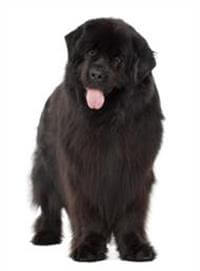Find products that match your dog’s needs

The Newfoundland breed, often affectionately known as the “Newfie,” is a remarkable canine from Canada, celebrated for its impressive size and gentle temperament. With their fluffy coats and striking presence, Newfoundland dogs are hard to miss. Renowned for their exceptional water rescue abilities, these dogs are equipped with webbed feet and a large lung capacity, making them excellent swimmers. Understanding the Newfoundland dog breed's temperament and characteristics is crucial for potential and current owners, especially when raising Newfoundland puppies. As full-grown Newfoundland dogs, they are gentle giants, making them loyal companions and protective family members.
Here are a few key factors you must keep in mind before bringing a Newfoundland dog breed home:
Weight | 45 to 68 kg |
Height | 26 to 28 inches |
Lifespan | 9 to 10 years |
Coat | Thick double coat |
Note: The weight and height mentioned on the table is of a full-grown Newfoundland and not of Newfoundland puppies.
The Newfoundland is renowned for its dense, water-resistant double coat, which provides warmth in cold environments. The coat colours of this majestic breed include:
Extra fun fact: A Newfoundland once reportedly saved Napoleon Bonaparte from drowning!
Despite its distinctive appearance, the Newfoundland breed is sometimes mistaken for other large breeds, such as the Landseer European Continental Type, which is actually a separate breed. To identify a purebred Newfoundland, here’s what you should keep an eye out for:
Newfoundland puppies grow rapidly, developing their signature fluffy coats and gentle temperament early on, making them beloved companions from a young age.
The Newfoundland breed is celebrated for its gentle, affectionate temperament, making it an excellent family companion. Known as the 'nanny dog,' Newfoundlands are particularly loving towards children and get along well with other pets and strangers. Newfoundland canines thrive on social interaction and should not be left isolated. While their size might be imposing, their sweet nature and calm demeanour make them approachable for all ages. Newfoundland puppies benefit greatly from early socialisation, which helps them grow into confident adults. Their natural life-saving instincts and strong desire to please make them a joy to train. Despite the full-grown Newfoundland dog’s size, it remains playful and energetic, always eager to spend time with its family.
Early socialisation and consistent training are vital for the Newfoundland breed, ensuring these gentle giants grow into well-rounded adults. In fact, pet parents should introduce their Newfoundland puppies to various environments, people, and experiences to nurture natural curiosity and intelligence. Positive training methods, such as rewards and gentle guidance, are particularly effective, as a Newfoundland dog's temperament is trusting and affectionate. Harsh corrections can be counterproductive, as Newfoundland dogs respond better to encouragement. Training should continue into adulthood to maintain their good behaviour, considering the full-grown Newfoundland dog size and strength.
Every dog needs care, and Newfoundland dogs have their own set of care requirements. So, if you are planning to bring this dog home, here’s everything you need to know:
The Newfoundland breed, while generally healthy, is prone to certain breed-specific health conditions. Responsible breeders screen for issues such as elbow and hip dysplasia, cardiac disease, and cystinuria, which can lead to urinary stones. Regular veterinary check-ups are crucial for early detection and management of potential conditions. Newfoundland puppies should be monitored closely to ensure they develop properly, and early health screenings can prevent complications as they grow into full-grown Newfoundland dogs.
Newfoundland dogs have a thick, water-resistant double coat that requires regular grooming to maintain its health and appearance. Brushing two to three times a week is essential to prevent mats and control shedding, which is heaviest in spring and fall. During these periods, daily brushing may be necessary. Bathing should occur every one to two months, depending on the Newfoundland dog breed's activity level. Routine nail trimming and ear checks are important to prevent discomfort and infections. Starting grooming practices with Newfoundland puppies helps them become accustomed to the process, ensuring a stress-free experience as they mature.
The Newfoundland is an active breed that requires at least 30 minutes of moderate exercise daily to maintain health and happiness. These dogs excel in both land and water activities, enjoying swimming, hiking, and even cart pulling. Mental stimulation is equally important, so engaging in activities like obedience, agility, or tracking can be beneficial. Newfoundland puppies should be introduced to exercise gradually, allowing them to develop at a healthy pace without overexertion, especially given their large size.
Providing high-quality food is essential for the Newfoundland breed, particularly during their growth phases. Newfoundland puppies require a balanced diet with 22 to 24 percent protein and 12 to 15 percent fat to support steady growth. Feeding should be divided into two meals daily to prevent bloat, a serious condition in large breeds like the Newfoundland. Portion control is vital to avoid obesity, and the nutritional needs may vary based on the Newfoundland dog's size, age, and activity level. Consulting a veterinarian for specific dietary recommendations ensures your Newfoundland remains healthy throughout its life.
The Newfoundland breed originated from the Canadian province of Newfoundland, where it was closely associated with local fishermen. Its exact origins remain a mystery, but it's believed to have evolved from various European breeds and possibly interbred with native wolves. By the late 18th century, the breed was named and popularised, thanks in part to figures like Sir Joseph Banks and Sir Edwin Landseer, who immortalised them in art. Despite facing near extinction in the 1780s due to governmental restrictions, the Newfoundland's legacy was preserved and continues to thrive today. The Newfoundland's rich heritage and enduring legacy as a beloved working companion dog highlight its unique qualities. Nowadays it is a cherished gentle giant by families worldwide.
The average lifespan of a Newfoundland is typically 8 to 10 years. This Newfoundland dog breed requires regular veterinary care and a healthy lifestyle to maximise their longevity.
The Newfoundland temperament is gentle, affectionate, and patient. This breed is known for its calm demeanour and friendly nature, making it ideal for families and social environments.
Yes, the Newfoundland breed is an excellent family dog. Their gentle and protective nature, combined with their affectionate temperament, makes them wonderful companions, especially for households with children.
Newfoundland puppies are generally easy to train due to their intelligence and eagerness to please. Consistent, positive reinforcement methods work best for this gentle canine breed.
Feed your Newfoundland puppy a diet that supports slow, steady growth. Typically, 4 to 5 cups of high-quality puppy food, divided into two meals daily, is recommended. Adjust based on activity level and growth.

Find a PEDIGREE® stockist
near you!
Buy online
Click to buy from any of the retailers below

